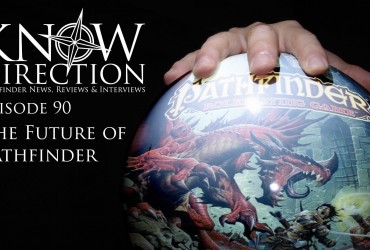Welcome to Guidance, Private Sanctuary’s source for tips and techniques for the Pathfinder Roleplaying Game, written by Everyman Gamer Alexander Augunas. Today, we’re going to be talking about prophecies in Roleplaying Games.
Continuing with our Harrow Month, today we’re going to follow up on Monday’s article and talk a little bit about prophecy usage in storytelling. Or rather, that lack of prophecy usage.
I Foresee a Cliché in Your Future
The number of stories that use prophecies as a plot point is astounding. In many ways, prophecies are the ultimate and oldest MacGuffins we have in storytelling. In many stories, when a protagonist says, “Why me? Why do I have to go on this quest?” some old guy waves a stick and shouts, “BECAUSE THE PROPHECY FORETOLD IT!” and that’s that. Nobody questions him. Nobody asks, “Hey, how do you know your prophecy is right?” Its just how things are done, and as a result prophecies are often viewed as a clichéd element of storytelling. And what, exactly, makes them clichéd?
They’re always right, and that’s pretty boring.
Prophecy is Dead
So, from a traditional standpoint prophecies are pretty darn boring because whatever it says will happen, happens. “The hero is destined to defeat the dragon and save the village!” is sort of like a massive spoiler for how the story is supposed to go. For this reason, in our modern area of storytelling (let’s say the past ten years or so, just to be safe) we’ve seen an uprising in what I’ll call the faux prophecy, or a prophecy that the author goes out of his or her way to discredit during the course of the story. The idea is that everyone expects the prophecy to be true, so it’ll be an epically amazing plot twist when, surprise, it isn’t. The prophecy crumbles and everyone is running around screaming, “Why?! Oh, gods, why?!”
And yet, in a twisted way, these prophecies often do come true anyway. It’s the classic bait-and-switch; it looks like the prophecy failed to build dramatic suspense, but in reality, the prophecy was right all along. And like a jump scarce, a reader or roleplayer can only fall for this fakeout so many times before they grow weary of it.
Enter Paizo Publishing. When designing the Inner Sea campaign setting, one of the first things that Paizo did was kill off prophecy. Literally. They included a prophecy of something that was supposed to happen involving one of their gods, and then they killed that same god. The backlash shattered prophecy throughout the campaign setting, so prophecies no longer “work” in the sense that when they come true, they’re nothing more than coincidence. Nothing is fated to happen anymore.
Is this a good thing, or a bad thing?
Change of Heart
So, why are we seeing a departure from prophecies in storytelling? That answer is actually fairly easy. Back in olden times, prophecies represented a sort of divine mandate, a decree from heaven that would occur regardless of mortal intervention. For the people that these sorts of tails were written for, this divine mandate represented a believe that things always worked out the way God wanted them to and that we as mortals have very little control over the realm of the gods.
Now, flash forward to the 1970s. Gary Gygax is busy creating Dungeons and Dragons. TSR picks the game up. Now both creator and publisher need to provide written adventures for PCs. Where are they going to go for inspiration? Why, the fantasy tales of old, of course! Those same tales were prophecy was a big thing. But as time rolled on and the 1970s became the 80s, and the 80s became the 90s, and so on, a certain shift in our (gamers) thinking occurred. As a population, we’re much more into “free will” and the importance of individual choice then we (humanity) was eight hundred years ago. While they can be epic and special and make you feel important, prophecies also lessen the importance of free will for a character, so it makes sense that we’re seeing prophecies slowly fade out. And with it being relatively okay to be an atheist (compared to the Dark Ages, anyway), we’re seeing games adapt more and more to that same sort of enlightened thinking, an emphasis on mortal choice rather than divine will.
But does that mean that prophecies need to die horribly in a fire forever?
“Modern” Prophecy
Personally, I think that the answer is no. There is still room for a good prophecy in a campaign setting or story, but the role of the prophecy needs to be changed somewhat. Looking at more recent works that include prophecy, I’m going to point to the Harry Potter series for this one.
Although this doesn’t come into play until halfway into the series, roughly Book Five or so, much of Harry Potter’s plot rests upon a secret prophecy that was made about Harry and Lord Voldemort. I’m going to include that prophecy here so you can ride it yourself.
“The one with the power to vanquish the Dark Lord approaches … born to those who have thrice defied him, born as the seventh month dies … and the Dark Lord will mark him as his equal, but he will have power the Dark Lord knows not … and either must die at the hand of the other for neither can live while the other survives … the one with the power to vanquish the Dark Lord will be born as the seventh month dies …”
Let’s talk about what makes this prophecy different than prophecies that we see in your typical, “The prophecy foretells that you will save us,” stories.
- The prophecy is vague. This is a major plot point in Harry Potter, that nowhere in this prophecy does it specifically call out Harry as the person who has the power to vanquish the Dark Lord. Rather, it names several conditions that Harry happens to fulfill. As a matter of fact, in the Harry Potter series it is revealed that there is a second child that this prophecy could have referred to, but Lord Voldemort chose to go after Harry first.
- The prophecy does not tell us how the story will end. This prophecy claims that Harry has the power to vanquish Voldemort, but nowhere does it say that Harry will win. It simply says, “Neither can live while the other survives.”
- The prophecy is given from an unlikely source. Harry Potter reveals that true mediums are exceptionally rare, and the whole practice is mostly smoke and mirrors. That said, this isn’t a prophecy that comes from the mouth of a god or a highly reputable source; it literally comes from the biggest hack of a medium imaginable.
- The prophecy is kept secret. Of course, Lord Voldemort finds out (the plot needs to more forward, after all) but for the most part the existence of the prophecy is widely kept a secret from everywhere. Most people know that Harry somehow defeated Voldemort, but virtually no one knows that he was prophesized to do so.
The most important aspects of this prophecy is the fact that it comes to pass specifically because Voldemort heard about it and chose to act upon it. For this reason, it is mortal action that makes this prophecy true, not divine will. Moving onward into the future, if we continue to see stories about prophecies, then this is the sort of prophecy that I believe we’ll be seeing. Mortal-driven prophecies that have no clear-cut outcome allow the players to choose what happens, and if the people involved choose to ignore the prophecy, then the prophecy turns out to be wrong. If you’re playing in Golarion and want to use prophecies effectively in the wake of Aroden’s death, I’d say that this is the best way to do it.
And that wraps up my thoughts on prophecy for this week. What do you think? How do you use prophecies in your campaign setting? Do you find prophecies taboo or an important staple to the genre? How do you feel about the “Death of Prophecies” in Golarion? Leave your answers, comments, and questions below and I hope you’ll come back for more advice and anecdotes from my gibbering mouth next week!
Alexander “Alex” Augunas has been playing roleplaying games since 2007, which isn’t nearly as long as 90% of his colleagues. Alexander is an active freelancer for the Pathfinder Roleplaying Game and is best known as the author of the Pact Magic Unbound series by Radiance House. Alex is the owner of Everyman Gaming, LLC and is often stylized as the Everyman Gamer in honor of Guidance’s original home. Alex’s favorite color is blue, his favorite Pathfinder Race/Class combination is kitsune rage prophet, and he dreams of a world where he was prophesized to be rich, famous, and working for Paizo. Thanks for breaking prophecy, Cosmo!






Leave a Reply